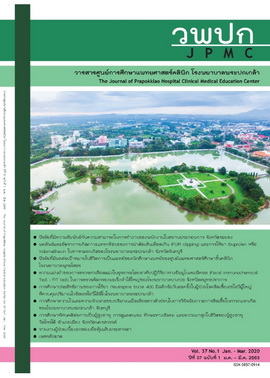Accuracy of FIT Test in Screening Colorectal Cancer in Bang Bo Hospital, Samut Prakan Province
Main Article Content
Abstract
Background: In Thailand, colorectal cancer has been ranked as third in males and fourth in females, with a prevalence of 1.0 percent. The mortality rate is about 3,000 per year. According to statistical data from the Department of Surgery at Bang Bo Hospital, the number of colorectal cancer cases is on the rise: in 2016 (49 cases), 2017 (55 cases), and in 2018 (56 cases). However, colorectal cancer can be detected at an early stage with the FIT test.
Objectives: To study the accuracy of the FIT test to screen for colorectal cancer in the patients at Bang Bo Hospital, as well as to study the factors related to colorectal cancer, such as gender, body mass index, drinking history, smoking history, diabetes, and hypertension.
Materials and methods: This research is a retrospective study. The data was collected from the patients’ medical records, who had undergone colorectal cancer screening that had provided a positive result by using a FIT test and whose diagnosis had been confirmed by colonoscopy between 1 January 2017 to 30 June 2019. In addition, the data was analyzed in order to find the accuracy, and factors that were related to colorectal cancer.
Results: The accuracy of the FIT test for colorectal cancer screening at Bang Bo Hospital was 49.3% at the cut off value of 50 ng/ml. After analyzing the factors that were related to colorectal cancer with simple logistic regression statistics, it indicated that gender and hypertension had been the two factors that were related to colorectal cancer. Males have higher chance of colorectal cancer at a rate of 3.56 times more than females. Additionally, people with hypertension are 2.86 times more likely to develop colorectal cancer than people, who do not have hypertension.
Conclusion: The accuracy of the FIT test for colorectal cancer screening at Bang Bo Hospital was 49.3%. Additionally, this study indicated that gender and hypertension are the two factors that are significantly related to colorectal cancer.
Article Details
References
Bray F, Ferlay J, Soerjomataram I, Siegel RL, Torre LA. Jemal A. Global cancer statistics 2018: GLOBOCAN estimates of Incidence and mortality worldwide for 36 cancers in 185 countries. CA Cancer J Clin [Internet]. 2018 [ cited 2019 April 2]. Available from: https://onlinelibrary.wiley.com/doi/epdf/10.3322/caac.21492
Ministry of Public Health, Office of Permanent Secretary. Public Health Statistics A.D.2017 [Internet]. Nonthaburi: Strategy and Planning Division; 2018 [cited 2019 April 2]. Available from: http://bps.moph.go.th/new_bps/sites/default/files/stratistics60.pdf
Issa IA, Noureddine M. Colorectal cancer screening: an updated review of the available options. World J Gastroenterol 2017;28;23:5086-96.
O-charoenrat P. Clinical application of molecular genetics in colorectal cancer. In: Sirivongs P, Jareonsetmaha S, Thavichaigarn P, editors. Surgery 32: Current practice in colorectal surgery. Bangkok: Bangkok Wetchasan; 2006; P.1-3.
Jass JR. Classification of colorectal cancer based on correlation of clinical, morphological and molecular features. Histopathology 2007;50:113–30.
American Cancer Society. Colorectal cancer facts & figures 2017 – 2019 [Internet]. Atlanta: American Cancer Society; 2017 [ cited 2019 April 19]. Available from: https://www.cancer.org/content/dam/cancer-org/research/cancer-facts-and-statistics/colorectal-cancer-facts-and-figures/colorectal-cancer-facts-and-figures-2017-2019.pdf.
Levin B, Lieberman DA, McFarland B, Smith RA, Brooks D, Andrews KS, et al. Screening and surveillance for the early detection of colorectal cancer and adenomatous polyps, 2008 : a joint guideline from the American Cancer Society, the US multi-society task force on colorectal cancer, and the American College of Radiology. CA Cancer J Clin 2008;58:130 – 60.
van Dam L, Kuipers EJ, van Leerdam ME. Performance improvements of stool-based screening tests. Best Pract Res Clin Gastroenterol 2010; 24:479–92.
Kittrongsiri K, Praditsittikorn N, Chaikledkaew U. Teerawatananon Y. Economic evaluation of colorectal cancer screening among Thai population. Nonthaburi: Health Intervention and Technology Assessment Program; 2014.
Elsafi SH, Alqahtani NI, Zakary NY, Al Zahrani EM. The sensitivity, specificity, predictive values, and likelihood ratios of fecal occult blood test for the detection of colorectal cancer in hospital settings. Clin Exp Gastroenterol 2015; 8 :279 -84.
Provenzale D, Gupta S, Ahnen DJ, Markowitz AJ, Chung DC, Mayer RJ, et al. NCCN guideline insights colorectal cancer screening, version 1.2018. J Natl Compr Canc Netw 2018; 16: 939-49.
Rerknimit R, Kullavanijaya P, Treeprasertsuk S, Pongprasobchai S, Rattanachu-ek T, Attasaranya S, et al. Feasibility of the Asia–Pacific colorectal cancer risk score and fetal immunochemical test for prioritization in colorectal neoplasm screening in Thailand: a multi-center study. Nonthaburi: Health System Research Institute; 2017.
Ministry of Public Health, Department of Medical Services. Guidelines for Operation and Data recording in Colorectal cancer screening. Bangkok: National Cancer Institute; 2017.
Lee JK, Liles EG, Bent S, Levin TR, Corley DA. Accuracy of fecal immunochemical tests for colorectal cancer: systematic review and meta-analysis. Ann Intern Med 2014; 160: 171.
Aniwan S, Rerknimitr R, Kongkam P, Wisedopas N, Ponuthai Y, Chaithongrat S, et al. A combination of clinical risk stratification and fecal immunochemical test results to prioritize colonoscopy screening in asymptomatic participants. Gastrointest Endosc 2015; 81:719-27.
Wilschut JA, Habbema JD, van Leerdam ME, Hol L, Lansdorp-Vogelaar I, Kuipers EJ, et al. Fecal occult blood testing when colonoscopy capacity is limited. J Natl Cancer Inst 2011; 103:1741-51.
Jitthai S. The sensitivity and specificity of guaiac fecal occult blood test (G-FOBT) and fecal immunochemical test (FIT) for colorectal cancer screening. J Med Tech Assoc Thailand 2013;41:4589-97.
Larsson SC, Orsini N, Wolk A. Diabetes mellitus and risk of colorectal cancer: a meta-analysis. J Natl Cancer Inst 2005;97:1679-87.
Campbell PT, Deka A, Jacobs EJ, Newton CC, Hildebrand JS, McCullough ML, et al. Prospective study reveals associations between colorectal cancer and type 2 diabetes mellitus or insulin use in men. Gastroenterology 2010;139: 1138-46.
Yanprechaset T. Sedentary behaviors increases the risk factor of developing cancers. Veridian E-journal, Science and Technology Silpakorn University 2018;5(4):1-15.

